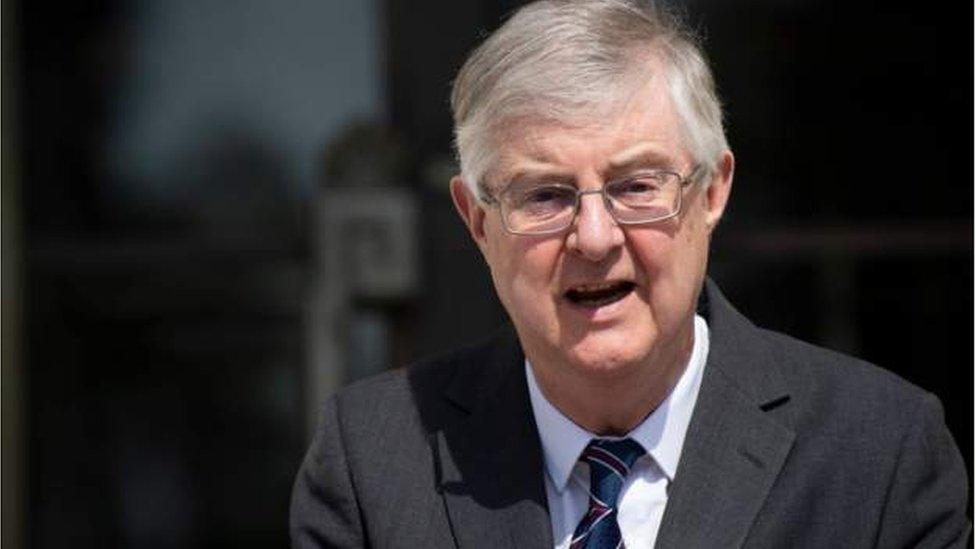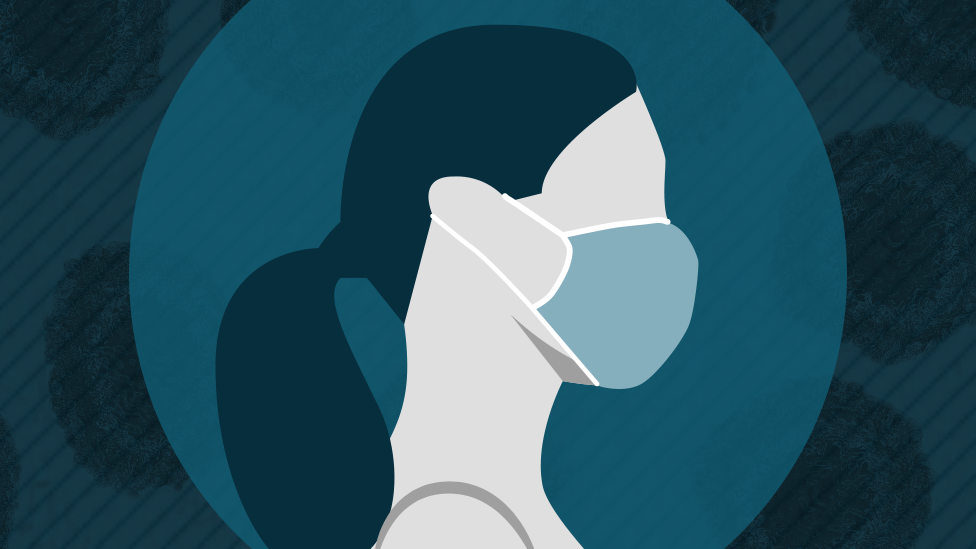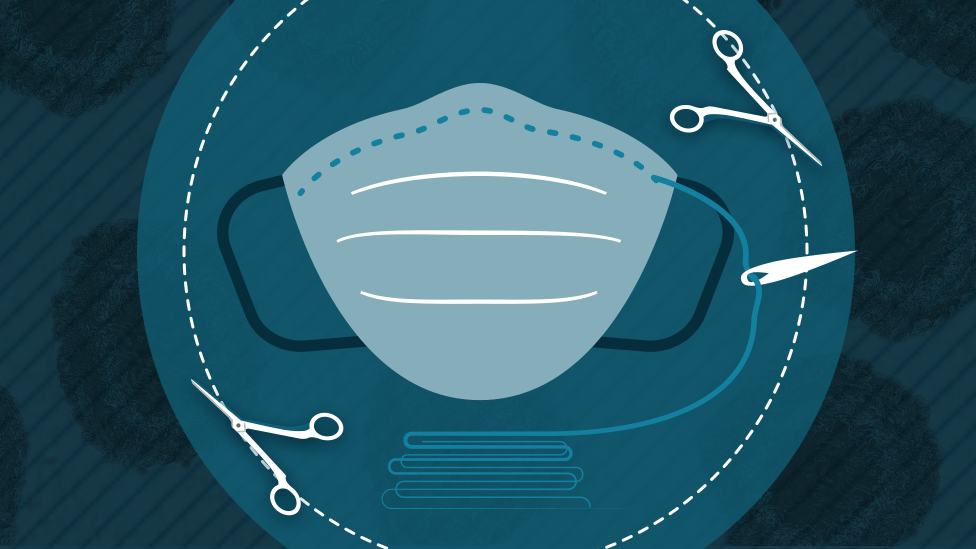Face masks: How is Wales' advice different to England?
- Published
The masks should be made of cotton, and even an old pair of socks can be used to cover your face
Face masks and face coverings - and where you must wear them - has changed over the course of the coronavirus pandemic.
And depending on where you live in the UK, different rules apply - from advice to mandatory rules stating you must wear one.
The situation in Wales has also changed since lockdown was introduced in March.
What is the Welsh Government's advice on wearing face masks?
At the outset in Wales, the advice on face masks from the chief medical officer Dr Frank Atherton was that there was only a "marginal public health case" for wearing them.
But both he and the Welsh Government always said they would keep the measure under review - and if the evidence changed, so would the advice.
On 13 July, First Minister Mark Drakeford announced the position was changing.
From Monday 27 July three-layer face coverings will be mandatory on all public transport in Wales - buses, trains, and taxis.
It brings Wales into line with Scotland, England and Northern Ireland, who all demand passengers wear face masks.

First Minister Mark Drakeford is taking Wales on its own path over face mask use
Mr Drakeford explained: "For the sake of simplicity and consistency, as well as being part of our plan to help reduce the risk of transmission while on public transport where it is not always possible to maintain a two metre physical distance, it will become mandatory for people to wear a three-layer face covering while travelling - this includes taxis."
He said having a different rule for wearing masks on public transport in Wales and England was "not sustainable in the long term".
"Our decision to make face coverings mandatory on public transport is a combination of the fact that we know as the economy gets back into operation more people will need to use public transport to go to work and for other purposes, and when more people need to use confined spaces then additional protections need to be introduced in order to overcome the fact that two-metre social distancing will not always be possible," added Mr Drakeford.
But the first minister has remained firm on face coverings for shopping or other activities - it is not happening in Wales.
"The advice of the Welsh Government is that if places are crowded then face coverings are advisory. Where places are not crowded, it is a matter for the individual citizen to make that decision."
He said huge steps had been taken by the retail industry in Wales to make their shopping spaces safer, with physical distancing measures, screens and one-way systems in place.
"At this point in time, when the prevalence of coronavirus is low, we are not mandating the use of face coverings in other public places," he said.
What has changed for England?
Initially, people in England were only "advised" to wear face coverings in situations where they may not be able to practise social distancing, such as on public transport or in some shops.
But again, that position has changed - and drastically so.
From 15 June, all passengers on public transport have been told they must wear face coverings.
From Friday, 24 July, that rule is extended to shopping, including popping out for a take-away meal. Those failing to cover their face will risk fines of £100.
It comes as changes to lockdown advice mean people who cannot work from home are being actively encouraged to go back to work, and Boris Johnson has started to lay out a "roadmap" to loosen the lockdown over time, which will inevitably lead to people mixing more.
Scotland went early on face mask advice
The Scottish Government was ahead of England on recommending the use of face masks at the end of April.
Advice soon became compulsory - on all public transport from 22 June, and mandatory in shops from 10 July.
Scotland's First Minister Nicola Sturgeon said the step had been taken now because the easing of lockdown restrictions meant that people were going out more.
"That brings much greater risk of the virus spreading," she warned.
Northern Ireland reconsiders its rules
At the moment, Northern Ireland's rules are similar to Wales - with mandatory face coverings imposed on passengers on 10 July.
There are exemptions for those with medical conditions, and it does not apply to children under the age of 13, or on school transport.
But that could all change again. Ministers are meeting on Thursday, 23 July, to discuss making face masks compulsory in shops.
NI's chief medical officer Dr Michael McBride supports the move, which is already in place in the Republic of Ireland, external.
What do scientists say on face mask use?


The World Health Organisation says medical face masks should only be worn by a person caring for someone with Covid-19.
However, on the use of non-medical masks, usually made of fabric, it says the scientific evidence for their benefit is limited.
One study showed medical workers using fabric masks were at increased risk of respiratory disease rather than decreased risk when compared with medical masks.
For ordinary people, the masks' protective effectiveness is "unknown", but they may protect others - not the wearer - if the wearer is an asymptomatic or pre-symptomatic carrier of the disease.
There can be risks associated with using masks, including a false sense of security leading people to breach social-distancing guidelines, and self-contamination that can occur by touching and reusing a contaminated mask.
Its conclusion? "Currently there is not enough evidence for or against the use of masks (medical or other) for healthy individuals in the wider community."
- Published16 March 2022

- Published13 January 2021

- Published10 May 2020
- Published27 September 2020
